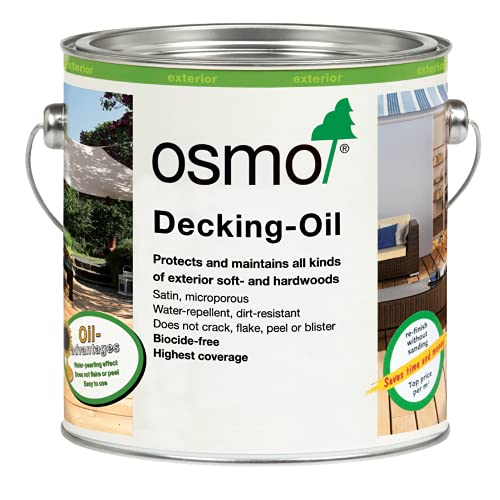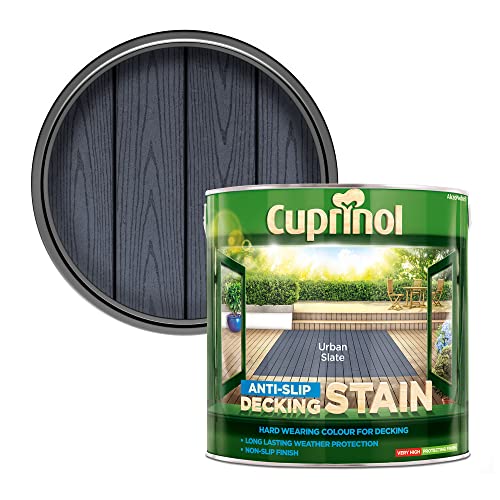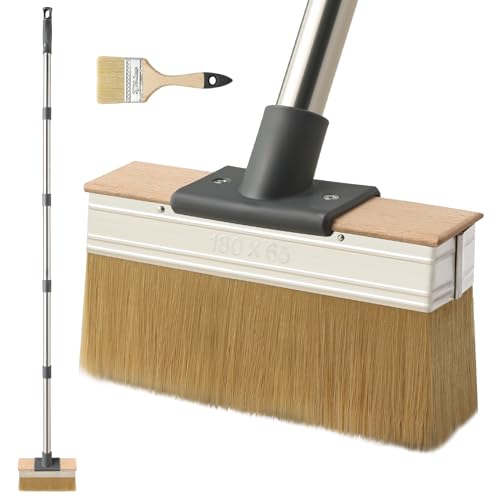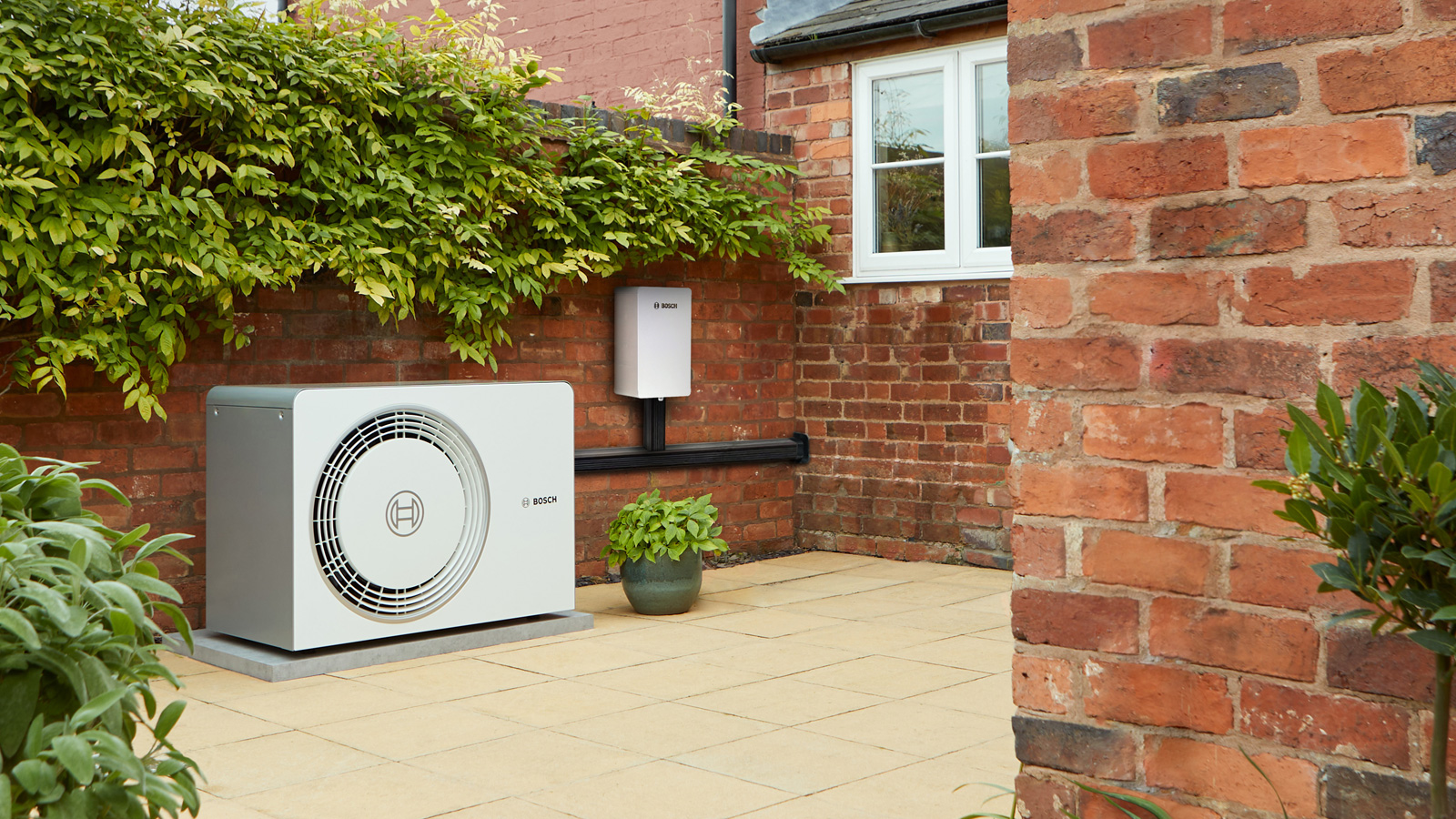Decking oil vs stain: Weigh up the differences to help you make the right choice
Experts reveal the pros and cons of decking oil vs stain. Choose style or substance
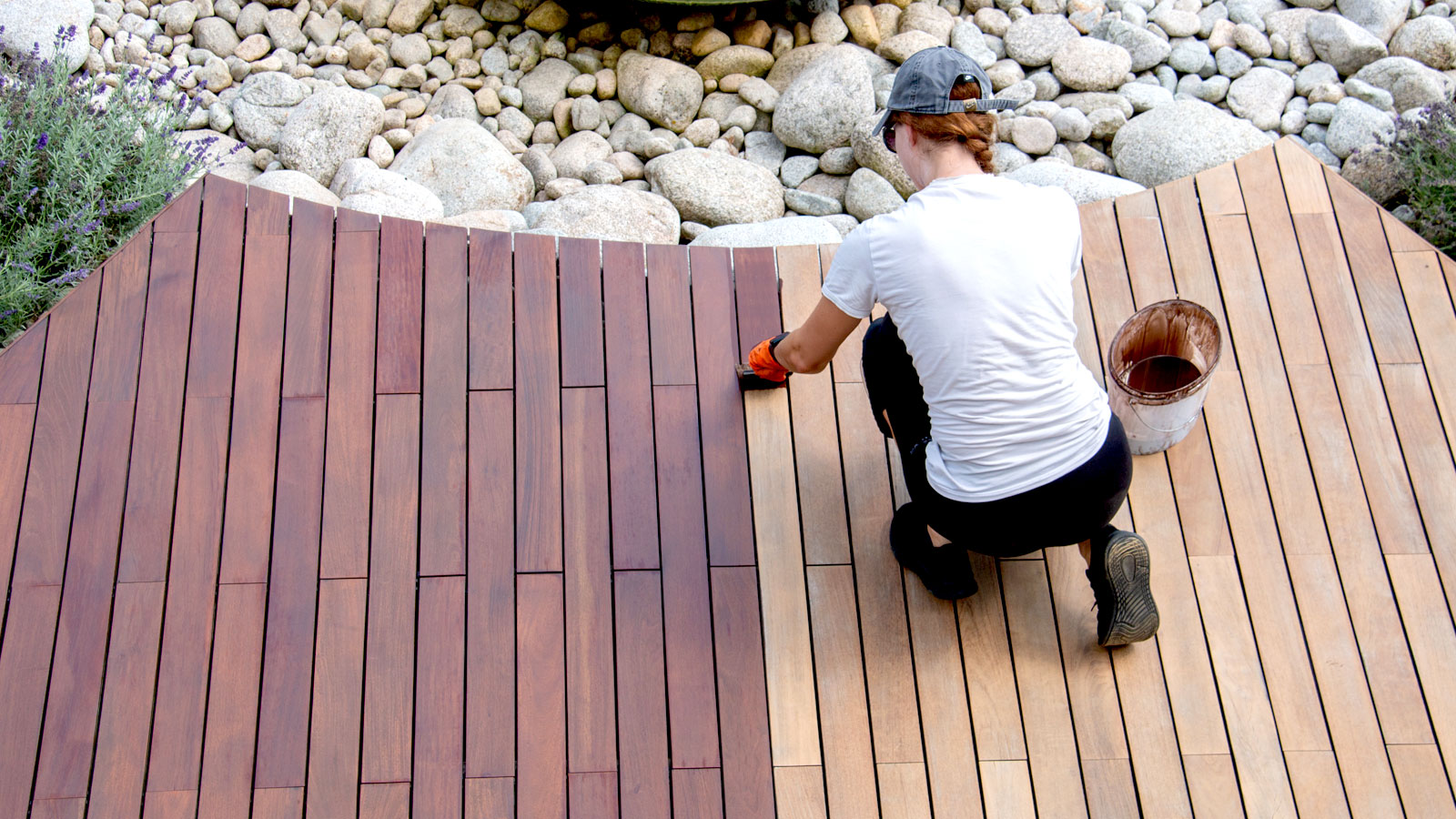
When it's time to protect your timber decking, it's typically a toss-up between decking oil vs stain. Which one will best suit your needs and achieve the finish you want? In reality, both do a good job, but there are some subtle differences that you need to know to help you make the right decision for you.
Do you want to keep the natural appeal of your timber decking? Do you want to add a colour that matches your garden decking ideas? Have you ever painted a deck before? The pros answer these questions and more to ensure you make the best choice for you.

Paul Cave is the UK Sales Director at Koppers PC, leading growth and customer relations. He focuses on sustainable construction and serves on the board of the Wood Protection Association.
Pros and cons of decking oil
+ Better penetration
“Decking oil is great for nourishing and protecting decking against the elements, as the oil soaks deep into the wood," points out Jimmy Englezos, DIY Expert and Senior Brand Manager at Ronseal. "Because of this, the timber is well protected against UV damage, as well as mould, mildew, and excess moisture."
+ Natural finish
To enhance timber decking, Englezos says, "Decking oil is ideal for achieving a natural finish that beautifully highlights the wood grain." He adds, "It’s also generally easier to apply, as you can simply use a brush and generally don’t need to sand the wood beforehand."
+Easy application
If you want to get a job done easily, Paul Cave, Sales Director at Koppers, says, "If you’re looking for a finish that’s simple, quick, and hard to mess up, decking oil has the edge. It penetrates the wood rather than sitting on the surface, meaning it won’t show brush marks or streaks." He adds, "For trades and DIYers alike, it’s a forgiving option that doesn’t require much more than a clean surface and a dry day."
– Short lifespan
A downside to decking oil is how long it lasts, as Cave explains, "While decking oils are great for nourishing timber and bringing out its natural grain, they typically need reapplying every 6–12 months, especially in high-traffic or exposed areas."
– Lack of colours
Decking oils are typically limited in colour as Cave shares, "Colour options are generally limited to natural wood tones." If you want a strong colour change, decking stain is often a better option.
Bring your dream home to life with expert advice, how to guides and design inspiration. Sign up for our newsletter and get two free tickets to a Homebuilding & Renovating Show near you.
– Longer drying times
Oil-based products usually take longer than water-based ones. As Cave shares, "Decking oils often need 6-12 hours between coats, and humidity can slow things down even more." This means it will take at least two days to treat decking, and possibly longer.

Jimmy is the Senior Brand Manager at Ronseal. He regularly provides insights and guidance on how to properly prepare wood for treatment, as well as handy tips and hints for general woodcare projects.
Pros and cons of decking stain
+ Quick-drying
Decking stain is comparatively quick drying. Cave says. "Water-based stains generally dry faster, some in as little as 2-4 hours. That means you can finish a job and recoat in the same day if the weather’s right."
+ Long-lasting
"Here’s where deck stain shines," explains Cave, "With a film-forming finish that sits on the surface, stains tend to resist UV, water, and wear better than oils." He adds, "That means fewer touch-ups and longer gaps between maintenance coats - often up to 2–3 years."
+ Cost-effective
Prices for stain and oil are typically similar, but thanks to decking stain's longevity, it's more cost-effective, shares Cave, "Decking stains might cost a bit more per litre, but their longevity means fewer recoats, less maintenance, and lower total spend over the life of the deck."
+ More colour options
Compared with decking oil, stain offers more options, shares Cave, "Decking stain provides a wider variety of colour choices, allowing you to change or refresh the look of your deck more easily." He adds, "It forms a protective film on the surface, delivering strong UV protection that helps prevent greying. It also provides consistent colour coverage across the timber."
– Hides natural wood grain
If you want to bring out the natural colour of decking, stain isn't always the best choice, shares Cave. "Stains can obscure the natural wood grain and offer less conditioning benefit to the timber compared to oils."
– More preparation
While decking stain is more resilient, it needs more preparation. Cave says, "Reapplication often requires more preparation, such as sanding or stripping previous layers." He adds, "If not applied or maintained correctly, the surface finish of a stain can peel or flake over time."
Try these to help protect your decking
Tools to apply decking stain and oil
Once you’ve decided on a decking stain or oil, you need to think about painting decking and the tools you’ll need. Englezos says, “Whether staining or oiling your deck, the tools needed are similar.”
He adds, “For both jobs, a good stiff decking brush or pad applicator (like this Fit For The Job 5pc Garden Decking Stains, Oils to Wood Painting Kit from B&Q) is essential, as it provides a smooth, even coat without wasting product.” If working on a grooved deck, you need to make sure that the deck is smooth. Any snags will catch the decking pad and rip it.
A specialist tool does a good job, but everyday alternatives typically work just as well, as Englezos shares, “Rollers can also be used.” This roller set (Lynwood 3 Piece Shed Fence Wood Paint Roller Set from Amazon) are designed for sheds, fences and decking, but you can use everyday rollers (like this Harris Seriously Good Walls & Ceilings Twin Medium Pile Paint Roller Set from Amazon).
Englezos adds, “Just make sure to go over the grooves with a brush to ensure full coverage.” Ideally, you want to use a water-based stain, which will make it much easier to clean any rollers you use.
Finally, Englezos suggests, “A pair of gloves, a paint tray, and a drop sheet are recommended to protect yourself and the surrounding area. The only extra product you may need is a decking stripper to remove any existing oil, paint or stain before application.”
It is worth noting that decking and paint strippers are no longer as effective as they once were. Try jet washing with one of the best Karcher pressure washers, leave it to dry, and then sand to revive a deck ready for painting.
FAQ
Should I use a water-based or oil-based stain?
Both water and oil-based stains do a good job on decking, but which one you choose to use will depend on your preferences. Englezos extolls the virtues of water-based stains: “Water-based stains dry quickly, making them ideal for unpredictable weather. They have minimal odour, and spillages can be cleaned up easily using water.”
But oil-based stains have their plus points as well, continues Englezos, “Oil-based stains offer deeper penetration and a richer, more natural finish, but they can take longer to dry – often up to 24 hours.”
Whether you choose decking stain or oil, smart ideas can transform your decking once it's dry. Check out our small decking ideas, decking lighting ideas, and decking balustrade ideas for insight and inspiration.
Steve Jenkins is a freelance content creator with over two decades of experience working in digital and print and was previously the DIY content editor for Homebuilding & Renovating.
He is a keen DIYer with over 20 years of experience in transforming and renovating the many homes he has lived in. He specialises in painting and decorating, but has a wide range of skills gleaned from working in the building trade for around 10 years and spending time at night school learning how to plaster and plumb.
He has fitted kitchens, tiled bathrooms and kitchens, laid many floors, built partition walls, plastered walls, plumbed in bathrooms, worked on loft conversions and much more. And when he's not sure how to tackle a DIY project he has a wide network of friends – including plumbers, gas engineers, tilers, carpenters, painters and decorators, electricians and builders – in the trade to call upon.
